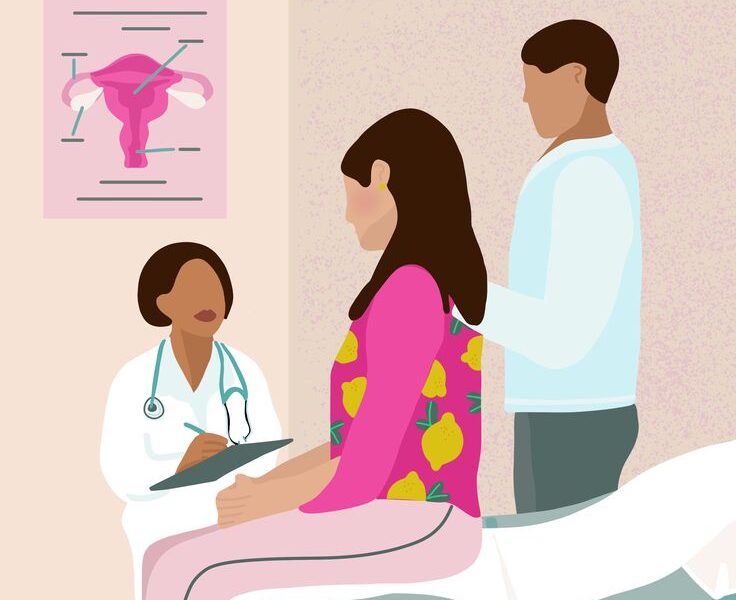There are so many people going through a hard time with infertility. It not only takes an emotional toll on you but also social stimgatisation.
Fertility refers to the capability of being able to conceive and it is estimated that 17.5 % of the population, roughly around 1 person in 6, worldwide have fertility problems. That could be you or me.
I will give a description of what the problems look like medically and I will also explain 2 cases ( not medical obviously) of women who battle the social problems faced with infertility in our society today. 😔
Lady Z, 27 years, known to have sickle cell disease and mother of one, just got into a new marriage and is excited about it. As she wanted to have yet another baby (she missed the feeling of holding a new born 🤗) Lady Z got right into it.
Month 1, nothing. Month 3 nothing. Month 10, still, nothing. The mother in law(MIL) starts asking questions. Year 2, nothing. She doesn’t quite understand what exactly is happening to her. ‘ I have a baby girl of my own. Why can’t I get another baby? ‘ Fights become the norm, with the man asking what is wrong with her. Talks of a new wife start being discussed by the MIL and family. The increased stress level causes flare ups in sickle cell crisis.
First time we talked about it, she mentioned that she might walk out of the marriage due to the pressure. ‘Doc I’m feeling tired of all this. They already want me out’ . I advised her to seek an OB/GYN consult and start the journey with them and have the husband tested as well (cause men too have fertility issues). The frequent visits to the outpatient clinic significantly reduced and soon, she was never seen at the outpatient. I thought to myself that maybe things got better.
And things did get better for her.
It was just a usual antenatal clinic day at the hospital when the nurse brought in an antenatal book for the next patient. The name: Lady Z.🤗🤗 I have never been happier. During the consultation she disclosed that she left the marriage and had found another guy and now there she was, 12 weeks pregnant. She looked happier herself. I should call her and get to know how she is fairing.
My second patient is a young lady, 31years, excited to start her life as a mother with her new husband. She finally feels as if her life is worth living and being thankful for. ‘ I am finally living the life I always dreamt of.’ she thought. But her thinking soon changes when she realizes that there are chances she might never get to have the title, biological mother.
Several visits to her gynecologist with the husband show that she is having multiple cysts within the ovaries and the tubes seem to be bilaterally blocked. Following nights and visits filled with tears, they decide on having an operation to try and salvage the tubes. The operation is done but it only confirms that this thought could actually become a reality. Her pelvis is frozen. She cannot afford IVF or a surrogate and adoption, well, it is something they might have to consider.
Now, the nights are filled with silence and doubts of what will happen to them. They still believe there is a way😔
For those who have considered the path of bearing children, living with the knowledge that it might not be possible to bear one puts you at a really grey area. Not to mention the social harrassement that you might get, the belittlement you might face and the stigmatization.
The health causes you ask? Let’s break it down, shall we?
What Is Infertility?
Medically, infertility is defined as the inability to conceive after 12 months of regular, unprotected sexual intercourse. For women over 35, the timeframe is typically reduced to 6 months due to the natural decline in fertility with age 🫤
Primary vs. Secondary Infertility
- Primary Infertility
This refers to couples who have never been able to conceive after at least one year of trying. It may be due to issues with ovulation, sperm quality, anatomical abnormalities, or hormonal imbalances. - Secondary Infertility
This is when a person has previously conceived naturally (regardless of the outcome of the pregnancy) but is now struggling to conceive again. Causes may be similar to primary infertility but can also include new complications, such as infections, age-related changes, or postpartum complications.
Common Medical Causes of Infertility
In Women:
- Ovulatory Disorders (e.g., PCOS, thyroid disorders)
- Tubal Blockages (e.g., due to pelvic inflammatory disease or endometriosis)
- Uterine Abnormalities (e.g., fibroids, polyps, congenital defects)
- Hormonal Imbalances
- Age-related Ovarian Decline
In Men:
- Low Sperm Count or Poor Sperm Motility
- Varicocele (enlarged veins in the scrotum)
- Hormonal Disorders (e.g., low testosterone)
- Ejaculation Disorders
- Infections or Trauma
.
A fertility workup usually involves both partners and includes:
For Women:
- Medical History and Menstrual Tracking
- Hormone Blood Tests (FSH, LH, AMH, thyroid, prolactin)
- Pelvic Ultrasound to check ovaries and uterus
- Hysterosalpingography (HSG) to assess fallopian tube patency
- Laparoscopy (in some cases) to detect endometriosis or adhesions
For Men:
- Semen Analysis (volume, count, motility, morphology)
- Hormonal Testing
- Scrotal Ultrasound if abnormalities are suspected
- Genetic Testing in cases of very low sperm count
.
Fertility challenges can be emotionally taxing, but understanding the underlying causes is a powerful first step. If you are going through this, receive my hugs and don’t forget to seek medical attention, both counseling and reproductive system review.
At Westlands Medical Center, we have our esteemed OB/GYN who will take you through all the steps to diagnose and formulate a plan.
¬ Daktari Muthoni¬

